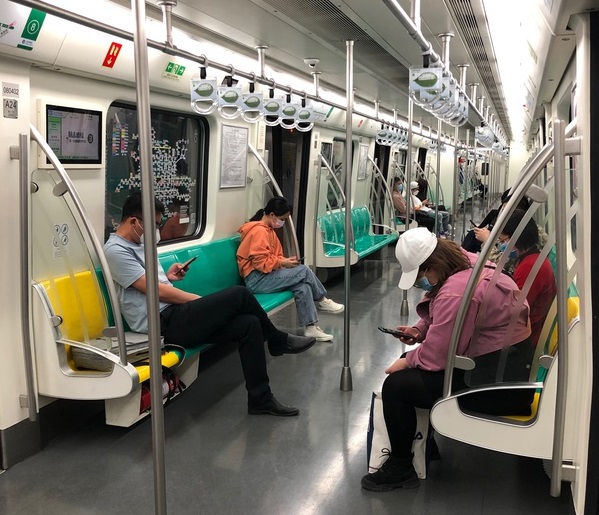Beijing-resident, Cameron Liu, wrote this article.
The image you see below was taken on a subway train in Beijing two days ago.

It is the middle of the day on a working day so there aren’t many people on the train. Of course, since the lockdown was lifted, public transportation is no longer as packed as before. As you can see, we still practise our social distancing, and everyone wears a mask.
My family and I stayed at home for almost 3 months and the furthest place we went during those 3 months was the gate of our building complex, for grocery shopping or fetching our deliveries.
The lockdown was different in China. Unlike most other countries, a high percentage of compliance was achieved.
As things got back under control, people are beginning to go back to work and moving on with their lives, while still being cautious and trying to keep it safe. Everyone outside still wears a mask and you have to get your temperature checked and provide your mobile number for the record before entering any store/restaurant/shop (in case they find out any problem and have to inform you).
In every taxi car, a clear plastic sheet (I don’t know what this is called – PVC?) has been installed to separate front seats for the driver and back seats for the passengers.
Also, to reduce people’s movement, every residence forms a committee. This committee issues a pass (something like a card with your name and your unit number on it) for each one of the residents who live in the building complex.
Without the pass, you cannot get into the complex (there are social workers working at the gate, checking for this pass and taking the temperature of everyone in and out).
This means that although you can go out for working, shopping and meeting friends now, it is still hard to visit friends or family by going to their places – since you will have no access without the pass of their building complex. Not many people live in their private houses in Chinese cities – most apartments are building complexes.
My point is that China took this pandemic seriously. And they are still doing. A lot of money was spent. China locked down a whole province back in January and the whole country has been in quarantine since then.
Everyone contributed to the battle by staying at home. We didn’t cry for freedom or claim people should have a choice to do self-isolation or not. Because we know this is not a political issue – it is pure science that a contagious disease spreads if you go out and interact with others. Even if you want to take the risk or you may be able to survive, your family, your community and the vulnerable you come in contact with, might not.
Not to mention the front line medical workers who are risking their lives to fight this for us. We should do our part as well otherwise it just won’t be fair to them.
***
Major highlights of China’s battle against the coronavirus pandemic:
1. They shut down Wuhan without a blink, a city with a population of around 11 million which also happens to be a major infrastructure and economic hub in China.
2. Around 10% of the entire medical personnel of China was moved to Wuhan to help. Salaries of all frontline medical personnel were tripled.
3. A 1000-bed capacity hospital was built in 10 days.
4. There were free tests and treatments for everyone. Efficient data tracking technologies were used to reach all contacts.
5. All Wuhan regional administration officials who were found to be inefficient in managing the outbreak were replaced.
6. Adequate support and food were provided to people during the lockdown. This ensured a high percentage of compliance.
7. Large-scale free tests across entire China and for travellers coming from abroad were conducted. Masks were provided everywhere you go.
8. The Chinese government literally threw untold billions to save its people without a blink. Some $71 million was provided to Wuhan residents after the lockdown to stimulate the local economy.


